免杀基础-hook
hook
什么是hook 用于拦截函数的执行过程,以获取或修改其执行时的数据 更改执行流程的一种技术
大体分两种
修改函数代码和修改函数地址
InlineHook
第一种我们称之为INLINE HOOK(内联hook) 它的特点是直接修改目标函数的代码,例如在函数入口处插入跳转指令,将控制流引导至自定义的处理逻辑,从而实现对函数行为的拦截和修改
32位下patch 目标函数前7个字节 目的是替换成自己的汇编 跳转到指定地址 这里用0x00占位
0xB8, 0x00, 0x00, 0x00, 0x00, // mov eax, lpMem
0xFF, 0xE0 // jmp eax编写代替函数 在函数内解除hook防止无限循环 再重新挂钩
int myMessageBoxW(
_In_opt_ HWND hWnd,
_In_opt_ LPCWSTR lpText,
_In_opt_ LPCWSTR lpCaption,
_In_ UINT uType) {
printf("111111111\n");
memcpy(Hookedfunc, originalBytes, 7);
int res = MessageBoxW(hWnd, lpText, lpCaption, uType);
installHook(Hookedfunc, myMessageBoxW);
return res;
};
hook 直接将函数开始的地方改为我们需要的硬编码 jmp到指定函数
void installHook(LPVOID Hookedfunc,LPVOID targetFunc) {
DWORD oldProtection;
char code[] = { 0xB8, 0x00, 0x00, 0x00, 0x00, // mov eax, lpMem
0xFF, 0xE0 // jmp eax
};
memcpy(originalBytes, Hookedfunc, 7);
DWORD_PTR lpMem = (DWORD_PTR)targetFunc;
memcpy(&code[1], &lpMem, sizeof(lpMem));
VirtualProtect(Hookedfunc, sizeof(code), PAGE_EXECUTE_READWRITE, &oldProtection);
memcpy(Hookedfunc, code, sizeof(code));
}
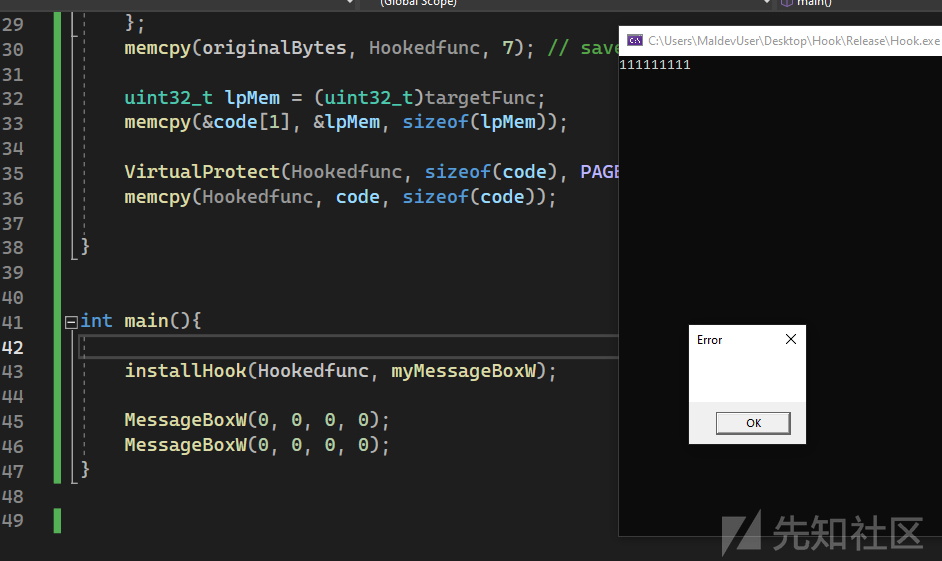
64位的也差不多
int myMessageBoxW(
_In_opt_ HWND hWnd,
_In_opt_ LPCWSTR lpText,
_In_opt_ LPCWSTR lpCaption,
_In_ UINT uType) {
printf("111111111\n");
memcpy(Hookedfunc, originalBytes, 13);
int res = MessageBoxW(hWnd, lpText, lpCaption, uType);
installHook(Hookedfunc, myMessageBoxW);
return res;
};
void installHook(LPVOID Hookedfunc,LPVOID targetFunc) {
DWORD oldProtection;
char code[] = { 0x49, 0xBA, 0x00, 0x00, 0x00, 0x00, 0x00, 0x00, 0x00, 0x00, // mov r10, lpMem
0x41, 0xFF, 0xE2 // jmp r10
};
memcpy(originalBytes, Hookedfunc, 13);
DWORD_PTR lpMem = (DWORD_PTR)targetFunc;
memcpy(&code[2], &lpMem, sizeof(lpMem));
VirtualProtect(Hookedfunc, sizeof(code), PAGE_EXECUTE_READWRITE, &oldProtection);
memcpy(Hookedfunc, code, sizeof(code));
}
这里还有很多优化的空间 但是对免杀来说已经够用了
IAT HOOK
第二种是修改函数的地址 比如常说的IAT hook SSDT hook
这类的特点是函数地址需要查表得到 那么我们可以篡改这个表来达到修改执行函数的目的
这里以IAT HOOK举例 通常是往目标进程注入dll 这里为了方便直接在当前进程搞了
首先获取到IAT 获取要hook的函数的地址
HMODULE hModule = GetModuleHandle(NULL);
PIMAGE_DOS_HEADER pDosHeader = (PIMAGE_DOS_HEADER)hModule;
PIMAGE_NT_HEADERS pNtHeader = (PIMAGE_NT_HEADERS)((DWORD_PTR)hModule + pDosHeader->e_lfanew);
PIMAGE_DATA_DIRECTORY pDataDir = (PIMAGE_DATA_DIRECTORY)&pNtHeader->OptionalHeader.DataDirectory[IMAGE_DIRECTORY_ENTRY_IMPORT];
PIMAGE_IMPORT_DESCRIPTOR pimport = (PIMAGE_IMPORT_DESCRIPTOR)(pDataDir->VirtualAddress + (DWORD_PTR)hModule);
FARPROC funcAddr = NULL;
while (pimport->Name != 0) {
PIMAGE_THUNK_DATA pOriginalThunk = (PIMAGE_THUNK_DATA)((DWORD_PTR)hModule + pimport->OriginalFirstThunk);
PIMAGE_THUNK_DATA pThunk = (PIMAGE_THUNK_DATA)((DWORD_PTR)hModule + pimport->FirstThunk);
while (pOriginalThunk->u1.AddressOfData != 0) {
PIMAGE_IMPORT_BY_NAME pImportByName = (PIMAGE_IMPORT_BY_NAME)((DWORD_PTR)hModule + pOriginalThunk->u1.AddressOfData);
if (_stricmp(pImportByName->Name, "MessageBoxW")==0) {
funcAddr = (FARPROC)pThunk->u1.Function;
break;
}
pOriginalThunk++;
pThunk++;
}
pimport++;
}
MessageBoxW(0, 0, 0, 0);
定义恶意函数 替换掉IAT中的目标函数为恶意函数
PVOID oldMessageBox = MessageBoxW;
typedef int (WINAPI* pMessageBoxW)(
_In_opt_ HWND hWnd,
_In_opt_ LPCWSTR lpText,
_In_opt_ LPCWSTR lpCaption,
_In_ UINT uType);
int myMessageBoxW(
_In_opt_ HWND hWnd,
_In_opt_ LPCWSTR lpText,
_In_opt_ LPCWSTR lpCaption,
_In_ UINT uType) {
printf("111111111\n");
pMessageBoxW MsgBox = (pMessageBoxW)oldMessageBox;
return MsgBox(hWnd, lpText, lpCaption, uType);
};
....
PIMAGE_IMPORT_BY_NAME pImportByName = (PIMAGE_IMPORT_BY_NAME)((DWORD_PTR)hModule + pOriginalThunk->u1.AddressOfData);
if (_stricmp(pImportByName->Name, "MessageBoxW")==0) {
VirtualProtect(&pThunk->u1.Function, 8, PAGE_READWRITE, &oldProtect);
pThunk->u1.Function = (DWORD_PTR)myMessageBoxW;
VirtualProtect(&pThunk->u1.Function, 8, oldProtect, &oldProtect);
break;
}
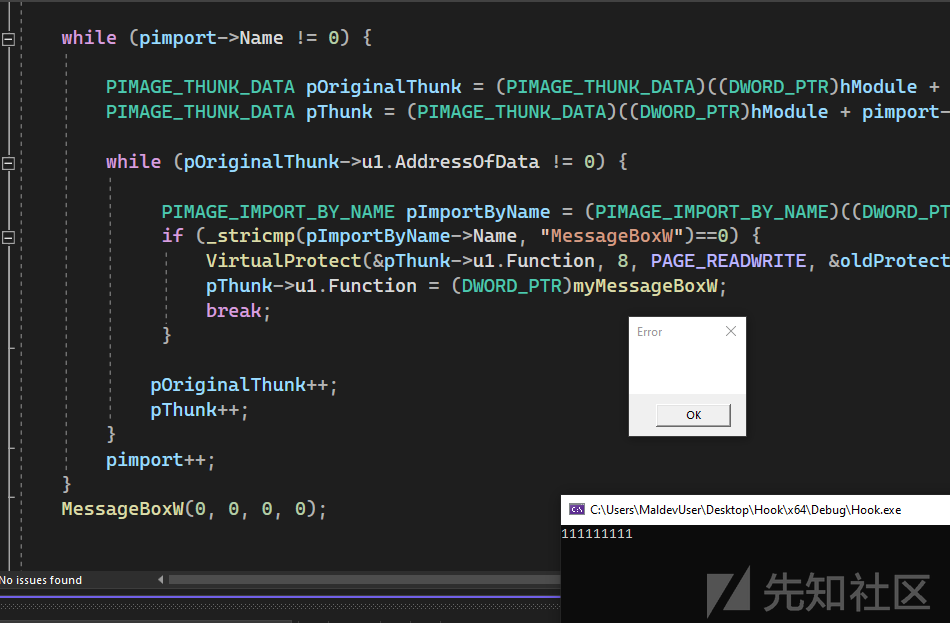
SSDT Hook
首先是获取SSDT
直接使用导出的全局变量KeServiceDescriptorTable即可
typedef struct _ServiceDescriptorTable{
PVOID pSSDTBase;
PVOID pServiceCounterTable;
ULONG ulNumberOfServices;
PVOID pParamTableBase;
} ServiceDescriptorTable, * PServiceDescriptorTable;
extern PServiceDescriptorTable KeServiceDescriptorTable;
这里我们选择hook NtAllocateVirtualMemory

调用号13
获取NtAllocateVirtualMemory的地址
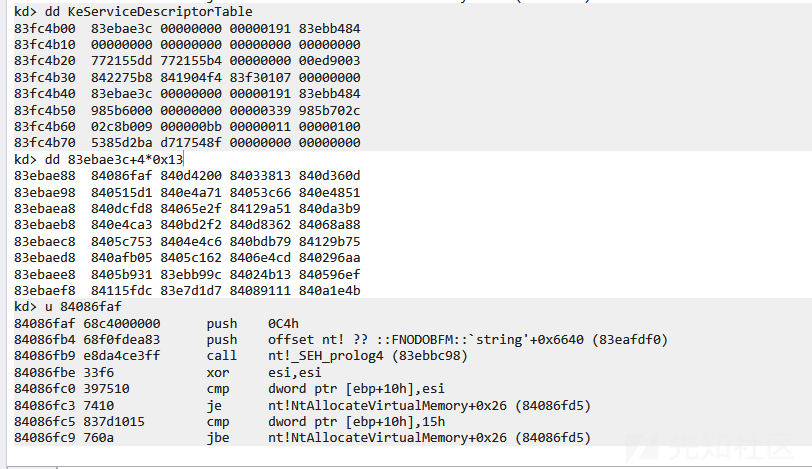
__try {
PVOID serviceTableBase = KeServiceDescriptorTable->pSSDTBase;
PVOID NtAllocateVirtualMemoryBase = (DWORD_PTR)serviceTableBase + (0x13 * sizeof(void*));
DbgPrint("0x%p\n", NtAllocateVirtualMemoryBase);
}
__except (EXCEPTION_EXECUTE_HANDLER) {
return GetExceptionCode();
}

修改表中函数
__try {
PVOID serviceTableBase = KeServiceDescriptorTable->pSSDTBase;
NtAllocateVirtualMemoryBase = (DWORD_PTR)serviceTableBase + (0x13 * sizeof(PVOID));
DbgPrint("0x%p\n", NtAllocateVirtualMemoryBase);
oriNtAllocateVirtualMemoryProc = *(PVOID*)NtAllocateVirtualMemoryBase;
*(PVOID*)NtAllocateVirtualMemoryBase = myNtAllocateVirtualMemory;
DbgPrint("Hooked!\n");
}
__except (EXCEPTION_EXECUTE_HANDLER) {
return GetExceptionCode();
}
定义替换的函数
PVOID NtAllocateVirtualMemoryBase = NULL;
PVOID oriNtAllocateVirtualMemoryProc = NULL;
NTKERNELAPI PCHAR PsGetProcessImageFileName(PEPROCESS Process);
typedef NTSTATUS (NTAPI* pNtAllocateVirtualMemory)(
_In_ HANDLE ProcessHandle,
_Inout_ _At_(*BaseAddress, _Readable_bytes_(*RegionSize) _Writable_bytes_(*RegionSize) _Post_readable_byte_size_(*RegionSize)) PVOID* BaseAddress,
_In_ ULONG_PTR ZeroBits,
_Inout_ PSIZE_T RegionSize,
_In_ ULONG AllocationType,
_In_ ULONG Protect
);
NTSTATUS NTAPI myNtAllocateVirtualMemory(
_In_ HANDLE ProcessHandle,
_Inout_ _At_(*BaseAddress, _Readable_bytes_(*RegionSize) _Writable_bytes_(*RegionSize) _Post_readable_byte_size_(*RegionSize)) PVOID* BaseAddress,
_In_ ULONG_PTR ZeroBits,
_Inout_ PSIZE_T RegionSize,
_In_ ULONG AllocationType,
_In_ ULONG Protect
) {
HANDLE currentProcess = PsGetCurrentProcess();
PCHAR currentProcessName = PsGetProcessImageFileName(currentProcess);
DbgPrint("%s\n", currentProcessName);
if (_stricmp(currentProcessName, "Console.") == 0) {
DbgPrint("111111\n");
}
pNtAllocateVirtualMemory oriNtAllocateVirtualMemory = (pNtAllocateVirtualMemory)oriNtAllocateVirtualMemoryProc;
return oriNtAllocateVirtualMemory(ProcessHandle, BaseAddress, ZeroBits, RegionSize, AllocationType, Protect);
}
因为这里分配内存是一个很常用的功能 我们指定只有当进程名为Console.exe 调用NtAllocateVirtualMemory时才进行相关输出
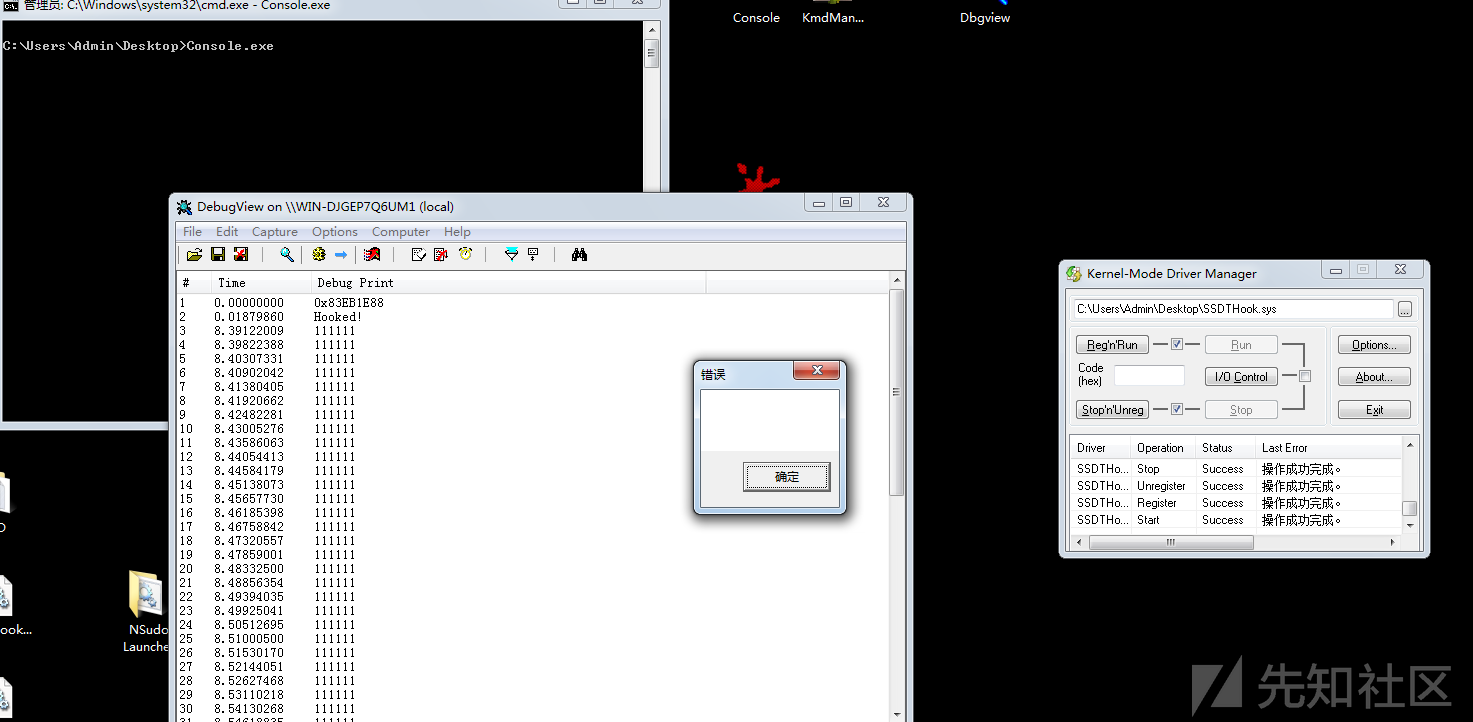
卸载时unhook
NTSTATUS UnloadDriver(PDRIVER_OBJECT DriverObject){
*(PVOID*)NtAllocateVirtualMemoryBase = oriNtAllocateVirtualMemoryProc;
DbgPrint("Unload!");
}
基于Detours
Detours是微软开源的hook库 使用起来也非常简单
#include <Windows.h>
#include <iostream>
#include <detours.h>
int
WINAPI
MyMessageBoxA(
_In_opt_ HWND hWnd,
_In_opt_ LPCSTR lpText,
_In_opt_ LPCSTR lpCaption,
_In_ UINT uType) {
std::cout << "Hooked!" << std::endl;
return 0;
}
int main()
{
auto msgbox = (void *)MessageBoxA;
DetourTransactionBegin();
DetourUpdateThread(GetCurrentThread());
DetourAttach(&msgbox, MyMessageBoxA);
DetourTransactionCommit();
MessageBoxA(0, 0, 0, 0);
getchar();
}
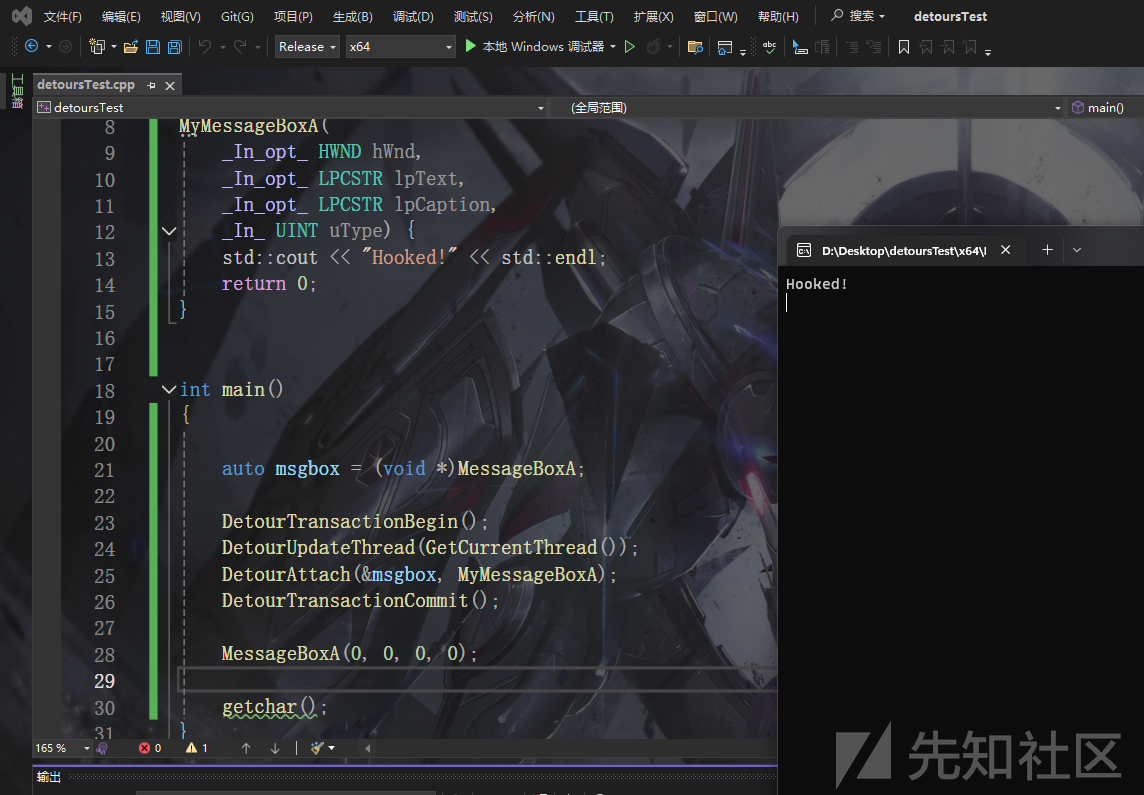
pe文件中存在明显特征 可以通过修改disasm.cpp来修改
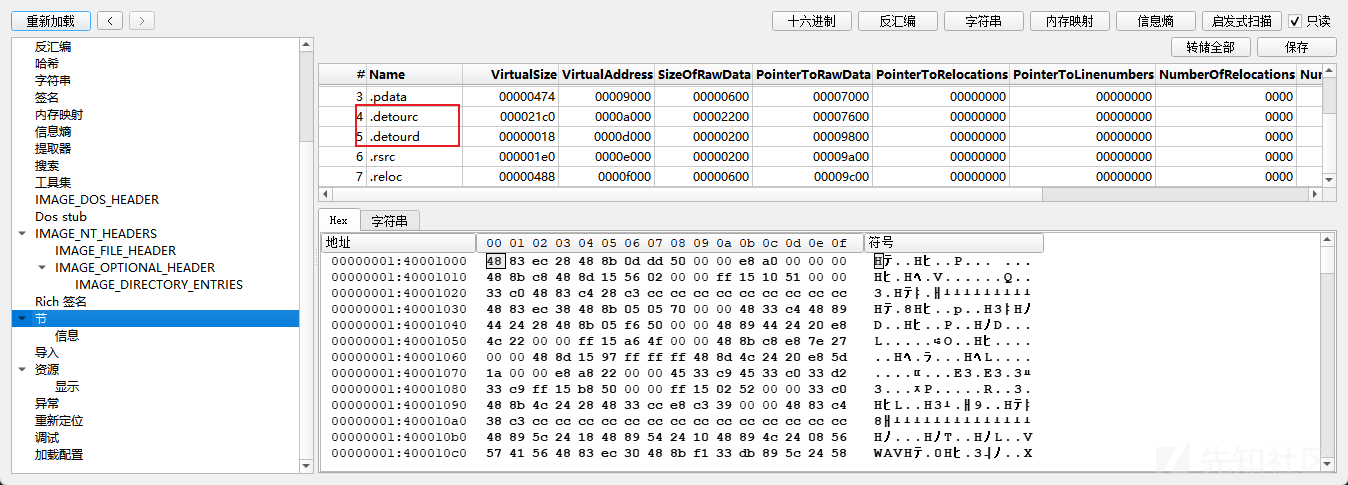
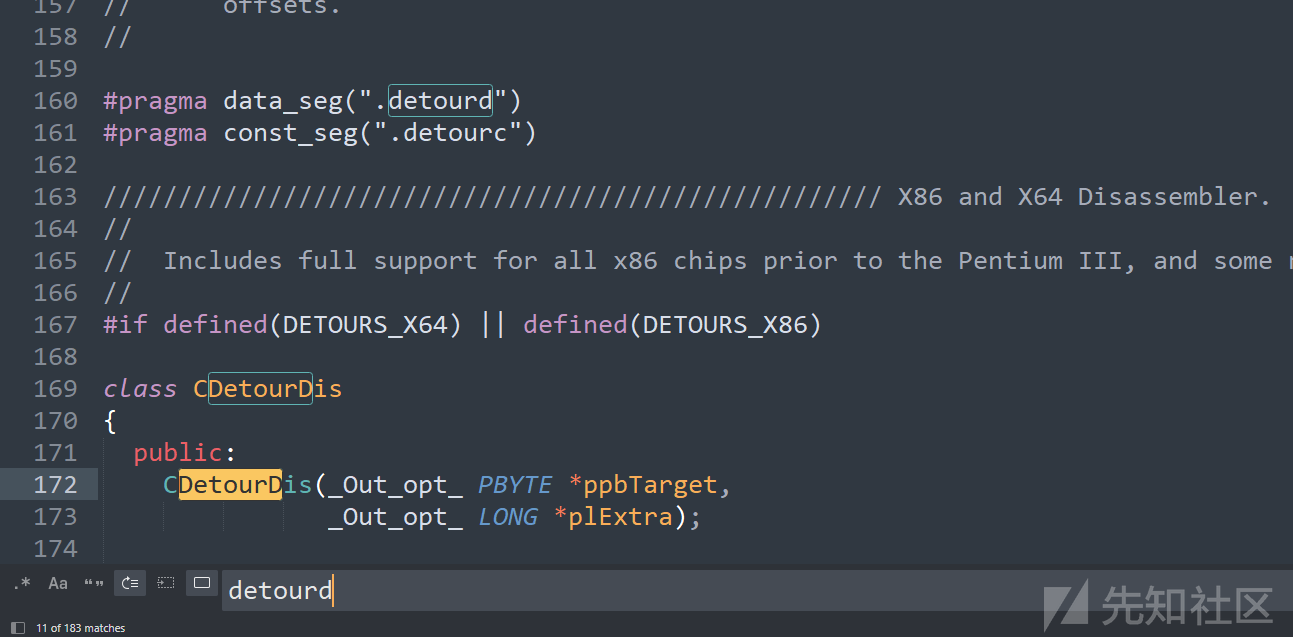
0 条评论
可输入 255 字

 转载
转载
 分享
分享
